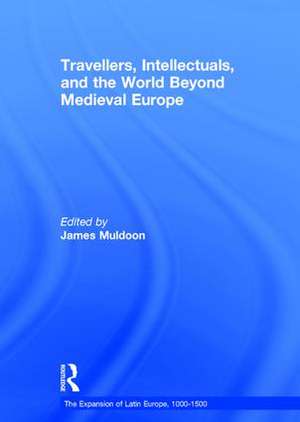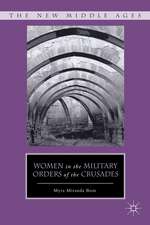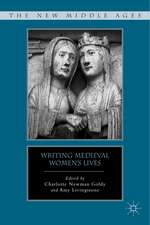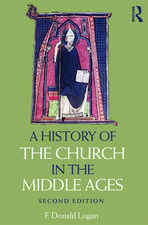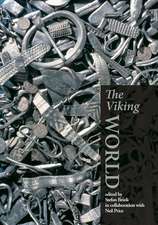Travellers, Intellectuals, and the World Beyond Medieval Europe: The Expansion of Latin Europe, 1000-1500
Editat de James Muldoonen Limba Engleză Hardback – 9 dec 2010
Preț: 1191.29 lei
Preț vechi: 1673.62 lei
-29% Nou
Puncte Express: 1787
Preț estimativ în valută:
227.98€ • 237.14$ • 188.21£
227.98€ • 237.14$ • 188.21£
Carte tipărită la comandă
Livrare economică 14-28 aprilie
Preluare comenzi: 021 569.72.76
Specificații
ISBN-13: 9780754659747
ISBN-10: 0754659747
Pagini: 406
Dimensiuni: 174 x 246 x 31 mm
Greutate: 0.98 kg
Ediția:1
Editura: Taylor & Francis
Colecția Routledge
Seria The Expansion of Latin Europe, 1000-1500
Locul publicării:Oxford, United Kingdom
ISBN-10: 0754659747
Pagini: 406
Dimensiuni: 174 x 246 x 31 mm
Greutate: 0.98 kg
Ediția:1
Editura: Taylor & Francis
Colecția Routledge
Seria The Expansion of Latin Europe, 1000-1500
Locul publicării:Oxford, United Kingdom
Cuprins
Contents: Introduction; Part I The Matter of Curiosity: Libertas Inquirendi and the Vitium Curiositatis in medieval thought, Edward Peters; Ecclesiastical attitudes to novelty c.1100-c.1250, Beryl Smalley; Medieval Christendom's encounter with the alien, Peter Jackson; The nature of the infidel: the anthropology of the canon lawyers, James Muldoon; Moslem-Christian understanding in medieval times, James Kritzeck; Knowing the enemy: Western understanding of Islam at the time of the crusades, Bernard Hamilton; Muhammad and the Muslims in St Thomas Aquinas, James Waltz. Part II The Muslim World - Crusade or Conversion?: From Friar Paul to Friar Raymond: the development of innovative missionizing argumentation, Robert Chazen; Talking to spiritual others: Ramon Llull, Nicholas of Cusa, Diego Valadés, Pauline Moffitt Watts; Saracen philosophers secretly deride Islam, John Tolan; Popular attitudes towards Islam in medieval Europe, Jo Ann Hoeppner Moran Cruz; William [of Malmesbury] and some other Western writers on Islam, Rodney M. Thomson. Part III The Mongol World: The conversion of a pagan society in the Middle Ages, Robert Bartlett; Missionaries and the marriages of infidels: the case of the Mongol mission, James Muldoon; Tartars, Jews, Saracens and the Jewish-Mongol 'plot' of 1241, Sophia Menache. Part IV Visualizing Knowledge of the World: Cartography in Europe and Islam in the Middle Ages, Norman J.W. Thrower; Some medieval theories about the Nile, O.G.S. Crawford; Shifting alterity: the Mongol in the visual and literary culture of the late Middle Ages, Maurizio Peleggi; Experiencing strangeness: monstrousness peoples on the edge of the Earth as depicted on medieval mappae mundi, Marina Münkler; Index.
Notă biografică
James Muldoon is Professor Emeritus, Rutgers University, and Invited Research Scholar at The John Carter Brown Library at Brown University, USA
Recenzii
'Editor James Muldoon, who is also co-editor for the series, has woven a tapestry of essays that offer substantial insight into the perception of non-Europeans not only in medieval Europe but also in the academic discourse from the past half-century... The articles are well chosen and illustrate a cross-section of scholarship on intellectual curiosity over the past sixty years.' Terrae Incognitae
Descriere
As the articles reprinted in this volume demonstrate, medieval men and women were curious about the world around them. They wanted to hear about distant lands and the various peoples who inhabited them. Travellers' tales, factual or fictional, and colorful mappaemundi entertained people and illustrated these other lands and peoples. Medieval travel literature was also informative, generating proto-ethnological information about the world beyond Latin Christendom that provided useful guidance for those such as merchants and missionaries who intended to travel abroad. These articles illustrate how travellers' reports in turn shaped the European response to the world beyond Europe, and are set in context in the editor's introduction.
